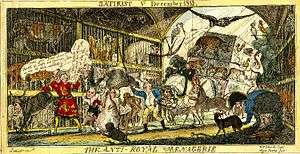Old Martin
Old Martin was a large grizzly bear given in 1811, when already full-sized, to George III by the Hudson's Bay Company.[1][2] The bear was sent to the Royal Menagerie, housed at the Tower of London. Although this was the first grizzly bear in England, the king said he would rather have had been given a new tie or a pair of socks.[1][3] The Royal Menagerie was closed in 1831 or 1832 by the Duke of Wellington, the governor of the Tower.[4] The bear and other animals were moved to the new London Zoo in Regent's Park – Old Martin died there in 1838.[2][3][5][6]

Writing in 1829 the zoologist Edward Turner Bennett said as a conclusion to his chapter on grizzly bears:
In no respect has the subject of the present notice, whose portrait admirably illustrates the peculiarities of his species, degenerated from the race of which he appears to be the sole representative in Europe. He was presented to his late majesty, more than seventeen years ago, by the Hudson’s Bay Company, and has long been the oldest inhabitant of the Tower Menagerie. The name of Martin, which was originally bestowed upon him, in imitation probably of that of the most celebrated bear ever exhibited in Europe, has consequently been of late years generally preceded by the epithet of antiquity, and Old Martin has become under that title almost as well known as his famous namesake. His size is far superior to that of any other bear that has ever been seen in this quarter of the globe; and his ferocity, in spite of the length of time during which he has been a prisoner, and of all the attempts that have been made to conciliate him, still continues undiminished. He does not offer the slightest encouragement to familiarity on the part of his keepers, but treats them with as much distance as the most perfect strangers; and although he will sometimes appear playful and good tempered, yet they know him too well to trust themselves within his clutch.[7]

During Old Martin's stay at the Tower, in 1816, a Yeomen Warder on night duty saw a ghostly bear near the Martin Tower and, terrified, he struck at it with his bayonet only to find it went right through the vision and stuck into the door behind.[3] It was said the guard died of shock a few hours afterwards.[3][5] Old Martin was not the first bear to have lived at the Tower of London because in 1251 Henry III had been given a polar bear by the king of Norway, Haakon the Young.[5]
In 1999 Old Martin's skin and skull were found at the Natural History Museum, London, catalogued as a "black bear", and were returned to the Tower for a special exhibition.[2]
Further reading
- Parnell, Geoffrey (26 October 1999). The Royal Menagerie At the Tower of London. Royal Armouries Museum. ISBN 9780948092428.
References
- "The Tower of London: Discover The Wild Beasts That Once Roamed The Royal Menagerie". www.hrp.org.uk. Historic Royal Palaces. Archived from the original on 25 March 2017. Retrieved 24 March 2017.
- Kennedy, Maev (18 October 1999). "Tower's old grizzly back on show". Guardian. Archived from the original on 25 March 2017. Retrieved 24 March 2017.
- Spragg, Iain (23 May 2014). "A Grizzly Sight, 1811". London's Strangest Tales: Historic Royal Palaces: Extraordinary but True Stories. Pavilion Books. ISBN 978-1-84994-189-1. Archived from the original on 25 March 2017. Retrieved 24 March 2017.
- Allaby, Michael (2010). Animals: From Mythology to Zoology. ISBN 9780816061013.
- "A grizzly ghost". www.hrp.org.uk. Historic Royal Palaces. Archived from the original on 25 March 2017. Retrieved 24 March 2017.
- "Discover The Entertaining History & Timeline Of The Royal Menagerie". www.hrp.org.uk. Historic Royal Palaces. Archived from the original on 25 March 2017. Retrieved 24 March 2017.
- The Tower Menagerie at Project Gutenberg